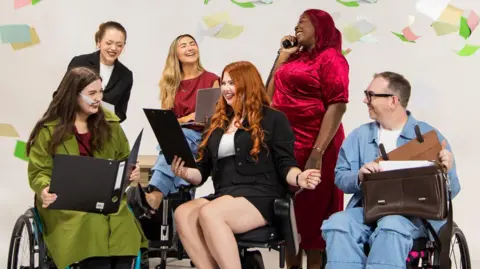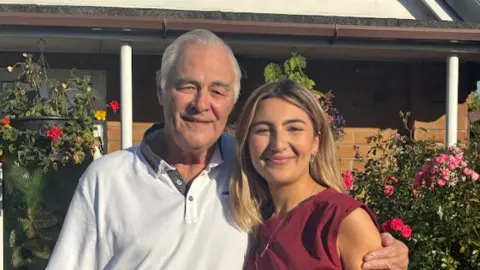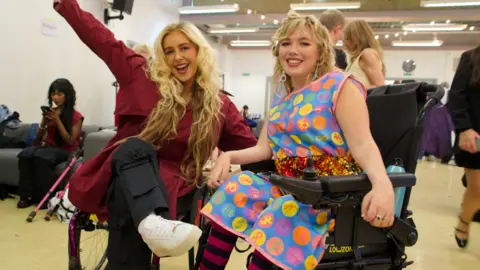
A designer who was told “disabled people don’t need fashion” says she felt so angered that she now has an adaptive clothing firm, which appeared on the catwalk at London Fashion Week.
As a student, Hanan Tantush was showcasing customised clothing for disabled people as part of her coursework – after seeing her grandad’s struggles following cancer surgery – when she heard the comment.
“That sentence made me so angry,” she says.
The 23-year-old, from Chester, says she believes the fashion industry has “evolved” but “disability is still treated as a niche”.
Her response was to build up the adaptive fashion firm Intotum – Latin for “as a whole” – which she platformed at London Fashion Week earlier this year.
‘Empowered not pitied’
The idea had been some years in the making after Hanan noticed her grandad Michael Myers struggle to find trousers he could wear with his stoma bag.
“Every pair of trousers rubbed against it or pressed on the bag,” she says.
“The only thing he could wear without pain was jogging bottoms and he hated how they looked.”

Her grandad had been a Merchant Navy engineer who wore his uniform with pride, she says.
“Every memory I have of him is of him looking sharp. Trousers pressed, shirt tucked in, shoes polished.”
But the stoma bag, she says, was affecting his lifestyle, accessibility and clothing.
“He’d often say how difficult it was to manage his stoma bag in public toilets, especially at football, and over time he stopped playing bowls for the same reason – something he’d done for 40 years.
“Seeing clothing strip away his confidence like that broke something in me.”
Hanan has since been involved in making and promoting stylish clothes tailored for people with different disabilities and neurodivergences, saying she wants them to “feel empowered, not pitied”.

About 17 million people in the UK have a disability – a quarter of the population – but Hanan says “disability is still treated as a niche”.
“When big brands launch ‘adaptive’ lines, they’re often just tracksuits in different colours,” she says.
“People tell me they want to feel stylish, to walk into a room and be seen for their outfit, not their condition.”
Items included wheelchair trench coats and capes, side-opening trousers and clothes with magnetic or Velcro fastenings instead of buttons.
After her grandad’s experiences, there are also items with discreet pockets for stoma bags.
“He tells everyone about my business. He knows he inspired it all,” she says.

Hanan wants to broaden her collections and eventually have branches in stores, saying: “Fashion – the very thing that should help us express who we are – has shut out an entire community.”
She says increasing the ability for disabled people to “dress without thinking twice about what they can or can’t wear” has prompted customers to contact her.
Some of those who have got in touch have told her “it’s the first time they’ve dressed independently in years”.
“That’s what success looks like,” Hanan says.